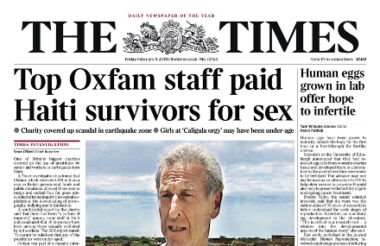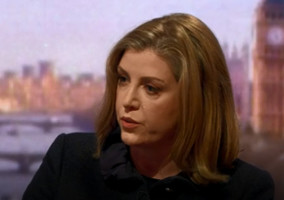On Friday the Times reported details of an internal investigation into staff who had found to be paying vulnerable Haitian women for sex. There were more revelations over the weekend: that the staff involved had been able to secure jobs in other charities, as well as separate allegations about Oxfam and other charity workers.
Oxfam stands accused of trying to cover up exploitation of vulnerable women to protect its own reputation and not doing enough to warn other charities or inform key stakeholders, including the Department for International Development and the Charity Commission.
From the timing and content of the stories, as well the reaction from politicians, the public and the media, we can learn about the culture and climate in parts of Oxfam in 2011 and society’s attitude to sexual abuse and exploitation in the present day.
What they cannot tell us, though, is what the situation regarding sexual misconduct in charities is now. That is why it is important not to rush to judgement, but also why Oxfam must now do everything in its power to demonstrate openness.
There are many questions that need to be asked of Oxfam, the Charity Commission and DfID to establish what happened in 2011, what the failings were, what the risk of this happening again is - both at Oxfam and other charities - and what steps can be taken to minimise those risks and reassure vulnerable beneficiaries, donors and the public.
Why now?
The first question on many people’s minds will be: why now? The events took place in 2011, so why are we only hearing about them seven years later?
At this stage it would be easy to go down the conspiracy theory route. ‘The right wing press have it in for charities’. ‘The Conservative Party hates big aid charities’ and ‘this is punishment for Oxfam’s poverty report last month’.
It’s tempting to clutch to these theories because it absolves charities of any responsibility and doesn’t require them to take any remedial action. But this is wrong, and clinging to the idea is potentially damaging for charities.
There is not, as far as I can see, any big conspiracy. But there is a reason that the story has made the front pages now.
Wider societal trend
This is part of a wider trend of calling out past and present sexual harassment and exploitation, which can be argued to have begun with allegations against Harvey Weinstein, and has now spread to almost every area of public life. We should not be surprised that charities are being touched by this.
There is a ripple effect. The more people speak out, the more confident others are in speaking out.
With better understanding of sexual abuse, harassment and predatory behaviour than ever before, the goalposts have also shifted, and past behaviour is now being seen differently and judged against today’s higher standards.
What was considered to be acceptable, or at least forgivable in the eyes of many, fifty, ten or even three years ago, is now rightly considered an appalling act of predatory and exploitative behaviour.
Essentially, this is a story about a men paying for sex, which is now A Thing in a way it maybe wasn’t a decade ago.
This all also makes the story more valuable to newspapers and means they are prepared to put the resource in to verify what they have been told, and to place it prominently - in this case three front pages in a row.
What did Oxfam get right?
Oxfam didn’t get everything wrong, and it’s important to remember that if we are to truly learn the lessons.
Firstly Oxfam’s initial reaction when the abuse in Haiti was reported was correct. It opened an internal investigation and those involved were removed quickly. It also contacted the Charity Commission and DfID - more on this later.
It is also correct in its approach towards greater transparency, which since 2011 has seen it become one of the leaders in the field. Its annual report and accounts are more detailed than most, including the publication of the number of complaints of sexual harassment. It would be a backward step if the reaction in Oxfam now was to close ranks and reduce the amount of information it publishes.
Lastly its reaction on Sunday clearly demonstrated contrition and a determination to improve. The charity should be commended and supported as it looks for ways to improve its own safeguarding in the future.
What did Oxfam get wrong?
The central charge from the beginning has been that Oxfam tried to cover this up. It is quite difficult to argue with this statement, especially given the initial response to the story on Friday morning.
Basically Oxfam was too slow to respond. News is getting faster and faster paced by the year, and first thing on Friday morning Oxfam had no public statement. The silence was deafening - and the void was filled with people condemning the charity, the sector and calling for an end to aid.
I got a press statement shortly before 11am. Even then it was a pretty poor statement. Yes Oxfam was appalled, and explained that its safeguarding processes had improved since then. But the statement was not attributed to anyone, making it feel as though Oxfam’s current leadership were trying to distance themselves from the mistakes of their predecessors.
Oxfam supporters got a personal email from the chief executive Mark Goldring on Friday evening. This was a better response, more personal in tone than the media statement and offered reassurance to supporters who might be concerned. But how many of them will have already heard condemnation of the charity in their workplaces, on the radio and via social media? It may have been too late to change their minds.
On Saturday morning, Goldring finally appeared on national radio via the Today programme - only about 24 hours after he should have done. By this stage there were more allegations to defend - that those who had been sacked or resigned were able to find jobs in other aid agencies.
Goldring went further on Saturday, expressly admitting that he wished the charity had made it clear that the issues related to sexual misconduct. I think he was right to say this. Having looked at our coverage from 2011, it really did not convey the seriousness of the incident.
Could Oxfam have done more in 2011?
There are also questions about whether Oxfam should have done more in 2011 to not only root out the culprits from Oxfam, but from the rest of the sector.
I wouldn’t want to leap to judgements without all the facts about the situation in Haiti, but I hope that as part of the ongoing external review the legal advice that told the charity not to report it to authorities is considered.
Meanwhile, there is the issue of staff references. While in most cases Oxfam provided no official reference, some of those who had been removed were able to continue working in the sector. Oxfam's failure to speak publicly about the allegations meant those staff were able to get new jobs via unofficial references from Oxfam colleagues.
The wider sector also has a role to play here. Why were charities employing people who were unable to obtain an official reference from their employer?
Oxfam appears to be calling for some sort database of aid workers and better sharing of information between agencies - this may be something of a logistical nightmare, and in the mean time it may be better for individual bodies to review their own recruitment processes.
And individuals who provided references in a personal capacity, when the charity would refuse to provide them, need to think about why they felt their former colleague deserved the chance to continue working with vulnerable people.
Questions for the Charity Commission
The Charity Commission has so far made two public statements on the subject, making clear that it thinks Oxfam has handled this badly. It is contacting Oxfam and demanding answers.
But what isn’t clear from either of its statements is whether anyone at the regulator pressed Oxfam for more detail about the events in 2011, or even demanded to see the final version of its report.
Speaking to Radio 4’s Today programme, Michelle Russell, director of investigations, refused to say why the regulator had not asked to see the full report, repeating that it would have acted differently if it had been given more detailed information by the charity.
To be fair to the regulator, safeguarding is an issue that it is taking incredibly seriously of late. It issued an alert to all charities at the end of last year urging them to review their policies if they have not done so within the year.
It’s also worth noting that it was 2012 when it published detailed guidance for the sector, setting out its expectations.
What now?
Oxfam’s senior leaders are meeting with the international development secretary Penny Mordaunt and the regulator today.
To her credit, Mordaunt appeared willing to hear the charity's side of the story when she appeared on the Andrew Marr show yesterday.
While she’s clearly, and rightly, very concerned about the “moral leadership” at Oxfam and more widely, at least she has appeared willing to look at the facts before rushing to judgement.
Inevitably this has opened up the ongoing debate about the UK’s aid budget, and the sector should be prepared for further scrutiny. It is important that charities are able to answer questions openly, quickly and fully.
Oxfam, and by default its beneficiaries, do not deserve to be punished for the actions of a few and the mistakes of managers who are no longer there. But at the same time, Oxfam and the wider charity sector must make sure that they understand what happened and why. They must take action to reduce the chances of it happening again, and, importantly, be seen to take this action.
Related articles












